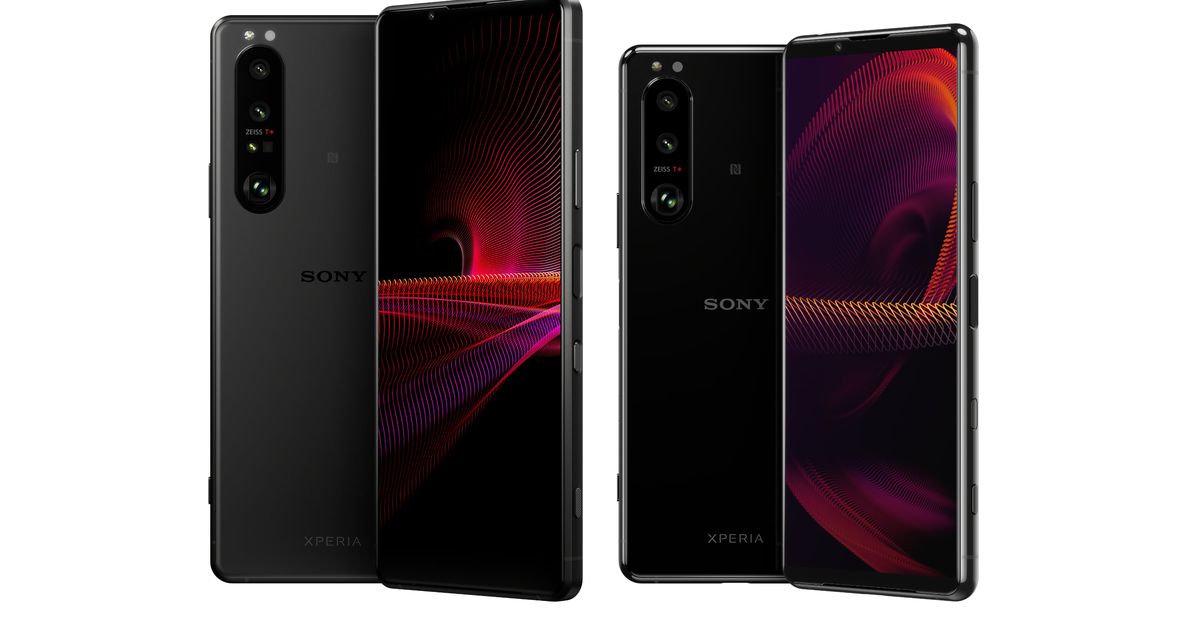
Sony is announcing two new phones today, the Xperia 1 III and the Xperia 5 III. Both are the latest in Sony’s campaign to redefine the Xperia brand as a kind of sibling to its well-regarded Alpha digital cameras. As such, the camera system is once again the main focus, and Sony specifically is touting the “world’s first smartphone with a variable telephoto lens paired with a Dual PD sensor” and improvements to its already fast and accurate autofocus system.
Pricing was not announced, but they should both be available in the US “this summer.”
Each phone has the basic specs you’d expect on a top-flight Android phone: three cameras on the rear, a Snapdragon 888 processor, and support for 5G. Actually, the 5G support is worth noting because these Xperia phones will be able to work on 5G networks in the US, something weirdly lacking on the last models. However, they’ll only work on the regular sub-6 networks on Verizon and T-Mobile, without support for AT&T’s 5G network. As is fairly usual for Sony, these will be sold directly rather than via carriers.
The phone also keep the Xperia design language Sony landed on with the original Xperia 1. They’re tall and narrow, with lots of glossy black and small curves on all the angles, giving them the most monolithic look of a smartphone today. I think they look great, but I’m also aware that they’re likely to cost a lot of money when Sony gets around to announcing the price.
In order to establish the Xperia brand, Sony has also been pushing a lot of other nice specs that are relatively hard to come by on other Android phones. The Xperia 1 III has a 4K OLED screen that now supports a fast (though locked) 120Hz refresh rate. There are dual speakers that are 40 percent louder and will work with Sony’s 360 Reality Audio format.
Sony is also enabling a special mode for the USB-C port that allows you to use a special cable to take an HD-resolution video signal from an SLR camera so you can use it as a monitor – much like the Xperia Pro can do with HDMI. That could also make them an interesting option for live streaming.
They’ll come in both dual-SIM and SIM+microSD variants. And there’s even a good ol’ headphone jack and a shutter button.
There’s also the more standard fare, like wireless charging and a 4,500mAh battery. When plugged in and gaming the phones can redirect power away from the battery to reduce heat. Both phones will ship with Android 11, but as of right now there’s no clear commitment to future software updates.
If you step down from the Xperia 1 III to the Xperia 5 III, you’ll get a very similar set of specs with a few exceptions. It’ll be smaller, of course. The larger phone has a 6.5-inch 21:9 display while the 5 has a 6.1-inch 21:9 display — at 1080p resolution instead of 4K. But it still has support for the periscope-style variable lens.
But again, the big push is on the cameras and here Sony has done quite a bit to improve the hardware. Sony is using three 12-megapixel sensors on the back, and both the main and telephoto lenses support OIS. (The Xperia 1 III also gets a time-of-flight sensor.)
Sony says it has lenses that are the equivalent to 16mm (f/2.2 ultrawide), 24mm (f/1.7 wide), and 70mm (f/2.3 telephoto), but that the telephoto can also reach to an f/2.8 105mm equivalent. That extra telephoto zoom comes thanks to a folded periscope lens design, and the Xperia is physically moving the lens elements to get different focal lengths.
The idea is that photographers will mostly stick to those focal lengths, but should they want to zoom further or use a zoom level in between the Xperia phones will utilize digital zoom.
Beyond the fancy hardware, Sony has iterated on its software. Unlike Google, Apple, and even Samsung, Sony is putting its emphasis on technical features rather than computational photography. It is claiming some improved low-light performance in some situations, but really the main emphasis is on features like autofocus and shooting speed.
These phones can take photos at up to 20fps with focus/exposure readings happening at 60fps. They also support 120FPS 4K in HDR. There’s still eye-tracking autofocus, but this year there’s real-time tracking for that autofocus. In a demo, Sony showed a subject turning around and when their eye was visible again, the camera adjusted.
Sony is finally integrating its pro camera app with the main camera app. There’s the “basic” mode like any smartphone, but it’s now quicker to get to the pro mode. Sony’s pro mode really is angled towards people who use Sony’s cameras, too: the interface is very similar.
On paper, all of this sounds really great. We’ll need to review them to see if these specs can translate to great experiences. Previous Sony Xperia phones have also had great camera hardware specs, but for taking quick shots they have often missed the mark. Treating a smartphone camera as a pro SLR-style camera could limit their appeal.
Sony’s tack with the Xperia line is to pack them to the gills with specs and features that will appeal to photographers and even videographers (there’s an excellent workflow-based video app included). In reality, however, Sony has struggled mightily to gain any measurable marketshare in the US. A lot of that has come down to higher prices than is the norm for even flagship Android phones, but some of it also comes down to availability. Without carrier partnerships or massive marketing budgets, these Xperia phones are more likely to appeal to camera enthusiasts than mainstream Android buyers.
https://news.google.com/__i/rss/rd/articles/CBMiVGh0dHBzOi8vd3d3LnRoZXZlcmdlLmNvbS8yMDIxLzQvMTQvMjIzODI4ODcvc29ueS1hbm5vdW5jZXMteHBlcmlhLTEtaWlpLXhwZXJpYS01LWlpadIBYWh0dHBzOi8vd3d3LnRoZXZlcmdlLmNvbS9wbGF0Zm9ybS9hbXAvMjAyMS80LzE0LzIyMzgyODg3L3NvbnktYW5ub3VuY2VzLXhwZXJpYS0xLWlpaS14cGVyaWEtNS1paWk?oc=5
2021-04-14 07:40:00Z
52781515116628
Tidak ada komentar:
Posting Komentar